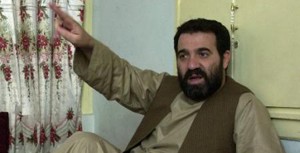By David Blair

The Times, November 24, 2007: "President Karzai's half-brother Wali, head of Kandahar's provincial council, continues to be accused by senior government sources, as well as foreign analysts and officials, as having a key role in orchestrating the movement of heroin from Kandahar eastward through Helmand and out across the Iranian border."
Thomas Schweich, who served as the State Department's most senior anti-drugs in official in Afghanistan until last month, said that Mr Karzai's overriding concern was to hold power. This had led him to protect 20 government officials, all linked to drug trafficking.
"The attorney general, who was just fired, told me he had a list of 20 corrupt officials who he was not allowed to prosecute," said Mr Schweich. "He [Mr Karzai] perceives that there are certain people he cannot crack down on and that it is better to tolerate a certain level of corruption than to take an aggressive stand and lose power."
Afghanistan is the world's largest heroin producer by far. This year's poppy crop covers an area of 200,000 hectares, according to Mr Schweich, making it the "biggest narco-crop in history".
He told the BBC that Mr Karzai was manipulating his Western allies and "playing us like a fiddle". Mr Schweich said: "The US would spend billions of dollars on infrastructure development; the US and its allies would fight the Taliban; Karzai's friends could get richer off the drug trade; he could blame the West for his problems; and in 2009 he would be elected to a new term."
Mr Karzai has repeatedly denied that his allies are linked to the drugs trade. He says that Afghanistan under his leadership has taken stronger steps against the traffickers than ever before.
Taliban insurgents fighting Nato troops in southern and eastern Afghanistan are believed to fund their campaign from the proceeds of the drugs trade. Relations between Mr Karzai, who faces re-election next year, and his Western allies have grown increasingly strained.



